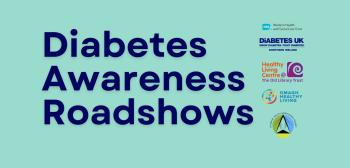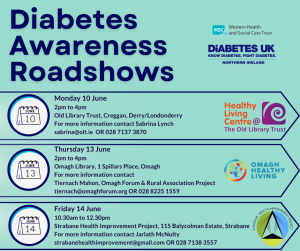05/06/2024

Marking Diabetes Week, Monday 10 June to Sunday 16 June 2024, the Western Trust, in partnership with the Healthy Living Centre Alliance and Diabetes UK, will kick off a series of roadshow visits for people living with type 2 diabetes, and at-risk of developing type 2 diabetes, to receive more information and advice on how to manage their condition well.
This year, the focus of Diabetes Week is to shine a light on the health checks people should look out for as part of their care – the areas that support you in living life to the full. Tying into the theme, the roadshows will provide a range of information in supporting members of the local community with their health and wellbeing.
The number of people living with type 2 diabetes has recently risen to just under 18,000 within the Western Trust area. A recent report released by the Department of Health also indicates that nearly 11,500 people in the area are registered with prediabetes, also known as non-diabetic hyperglycaemia. At a recent workshop coordinated by Developing Healthy Communities NI and supported by Diabetes UK, statutory and community representatives heard of the challenges faced by people living with diabetes and how it affects people living with health inequalities more.
Commenting on the roadshow, Lesley Hamilton, Diabetes Network Manager at the Western Trust, said:
“We are looking forward to delivering the roadshow in just a couple of weeks’ time. From the recent workshop, it was clear that there was a real cross-sector ambition to help those living with diabetes in the area and provide them with that extra layer of information and support. Diabetes is a complex and relentless condition; however we know the roadshows will be a great first step for members of the local community to drop by and learn more about managing their diabetes and what supports are available in their locality.”
“Diabetes is a chronic condition, with the majority of cases diagnosed as type 1 or type 2 diabetes. If you have type 1 diabetes, your blood sugar is too high because your body can’t make a hormone called insulin. Fewer than one in 10 people in the UK who have diabetes have type 1 diabetes. There is nothing you can do to prevent yourself or others from developing type 1 diabetes. Meanwhile, type 2 diabetes is high blood sugar levels due to your body not making enough insulin, or the insulin it makes not working properly, known as insulin resistance. Type 2 diabetes can go undiagnosed for years if you don’t display the common symptoms or your symptoms are missed. It doesn’t just affect people living with overweight or obesity, although this is one of the risk factors, along with ethnicity.”
“We’re delighted with the strong cross-organisational backing for the roadshow and subsequent support in the Western Trust area. In collaboration, representatives from Developing Healthy Communities, the Healthy Living Centre Alliance, NR Partnerships, Diabetes UK, GP Federations, the Western Trust Health Improvement, Equality and Involvement Team and Diabetes Team and Ulster University will be placing a real emphasis on increased support and funding for local communities in the West. This will go a long way in helping reduce the prevalence of type 2 diabetes and offer better access to support for type 1 diabetes.”

Roadshow dates and locations:
- Monday 10 June 2pm to 4pm at Old Library Trust, Creggan, Derry/Londonderry. For more information contact Sabrina Lynch at sabrina@olt.ie / 02871 373870.
- Thursday 13 June 2pm to 4pm at Omagh Library, 1 Spillars Place, Omagh. For more information contact Tiernach Mahon, Omagh Forum & Rural Association Project at tiernach@omaghforum.org / 028 8225 1559.
- Friday 14 June 10.30am to 12.30pm at Strabane Health Improvement Project, 115 Balycolman Estate, Strabane. For more information contact Jarlath McNulty at strabanehealthimprovement@gmail.com / 028 7138 3557.
Fermanagh Dates will be announced soon.
For more information and support regarding diabetes, visit www.diabetes.org.uk. The Diabetes UK helpline is also available Monday to Friday, 9am to 6pm on 0345 123 2399.




